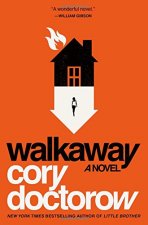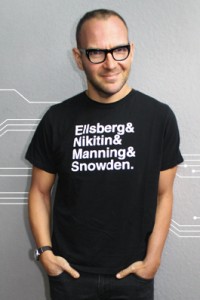Cory Doctorow: Bugging In

Cory Efram Doctorow was born July 17, 1971 in Toronto, Canada. He attended alternative schools and worked at SF specialty store Bakka Books, but dropped out of high school at 17 and briefly moved to Mexico to write. He dropped out of four universities in two years, and worked as a CD-ROM programmer, website designer, volunteer in Central America, CIO for a film company and an ad agency, founder of a software company, and finally began working for the Electronic Frontier Foundation, a civil rights organization with an emphasis on technology. He married Alice Taylor in 2008, and they have a daughter.
Doctorow made his first semi-pro sale at 17, and his first professional story, ‘‘Craphound’’, appeared in Science Fiction Age in 1998. He attended Clarion in 1992, and has since been an instructor there. He won the Campbell Award for Best New Writer in 1999, and novelette ‘‘0wnz0red’’ was nominated for a Nebula in 2004. ‘‘I, Robot’’ (2005) was a Hugo and British SF Award finalist, and won a Locus Award, as did ‘‘When Sysadmins Ruled the Earth’’ (2006) and ‘‘After the Siege’’ (2007).
First collection A Place So Foreign and Eight More (2003) won the Sunburst award in 2004, and more short work was collected Overclocked: Stories of the Future Present (2007) and With a Little Help (2010). PM Press published The Great Big Beautiful Tomorrow (2011) as part of their Outspoken Authors series. Other stories were adapted as comics in Cory Doctorow’s Futuristic Tales of the Here and Now (2008).
Locus Award-winning first novel Down and Out in the Magic Kingdom appeared in 2003, followed by near-future SF Eastern Standard Tribe (2004) and urban fantasy Someone Comes to Town, Someone Leaves Town (2005). His bestselling YA Little Brother (2008) won the Campbell Memorial Award, Prometheus Award, and Sunburst Award, and was shortlisted for the Hugo and Nebula Awards. It was also adapted as a stage play. YA sequel Homeland appeared in 2013, and a sequel for adults, Crypto Wars, is in progress. Other novels include Makers (2009), For the Win (an expansion of story ‘‘Anda’s Game’’), and Pirate Cinema (2012). His newest book is near-future optimistic SF Walkaway.
He has collaborated with Charles Stross on several stories, including ‘‘Unwirer’’, ‘‘Flowers from Al’’, and ‘‘Jury Service’’ and its sequel ‘‘Appeals Court’’, which formed the basis for novel The Rapture of the Nerds (2012). With Benjamin Rosenbaum he collaborated on Hugo and Nebula finalist ‘‘True Names’’ (2008). Graphic novel In Real Life, created with Jen Wang, appeared in 2014.
With Karl Schroeder he wrote non-fiction The Complete Idiot’s Guide to Publishing Science Fiction (2000), and some of his essays were collected in Content: Selected Essays on Technology, Creativity, Copyright, and the Future of the Future (2008). Follow-up Context: Further Selected Essays on Productivity, Creativity, Parenting, and Politics in the 21st Century appeared in 2011. Business and creativity book Information Doesn’t Want to Be Free came out in 2014. He is a contributor to popular blog Boing Boing, ‘‘a directory of wonderful things,’’ and co-edited anthology Tesseracts Eleven with Holly Black (2007).
Doctorow was European Affairs Coordinator for the Electronic Frontier Foundation until 2006, when he quit to write full time. He is a special consultant to the EFF now. He serves on the boards of various organizations related to technology and literature. He was named the 2006-2007 Canadian Fulbright Chair in Public Diplomacy at the USC Center on Public Diplomacy, and did a one-year writing and teaching residency at USC (2006-07). He received an honorary doctorate in computer science from Open University, where he is a visiting professor. He is also an MIT Media Lab Research Affiliate. He lives in Burbank CA.
Excerpts from the interview:
‘‘Walkaway is an ‘optimistic disaster novel.’ It’s about people who, in a crisis, come together, rather than turning on each other. Its villains aren’t the people next door, who’ve secretly been waiting for civilization’s breakdown as an excuse to come and eat you, but the super-rich who are convinced that without the state and its police, the poors are coming to eat them.
‘‘In Walkaway, the economy has comprehensively broken down, and so has the planet. Climate refugees drift in huge, unstoppable numbers from place to place, seeking refuge. The world has no jobs for most people, because when robots do all the work, the forces of capital require a few foremen to boss the robots, and a few unemployed people mooching around the factory gates to threaten the supervisors with if they demand higher wages. Everyone else is surplus to requirements.
‘‘But just because you’re useless to the rich and powerful, it doesn’t follow that you’ll lie down in a ditch somewhere to take yourself off the game-board. The ‘useless’ people declare the system to be the problem and walk away from it, forming a kind of parallel, bohemian society that uses software and automated manufacturing techniques to build a post-scarcity world on the fringes of the terminal phase of late-stage capitalism.
‘‘This is harmless enough for the powers that be, so it’s a relatively stable relationship – until, that is, the scientists who’ve been working on a moonshot project to create practical immortality treatments for the 0.1% decide to take their work to the walkaways – then, as the rich figure out they’ll have to spend eternity with us, all out war breaks out.
‘‘It’s a book about the struggle between people who think other people are the problem (the rich) and people who think other people are the solution (everyone else).”
…
‘‘Awareness of self-deception is a tactic that’s deployed very usefully by a lot of people now. It’s at the core of things like cognitive behavioral therapy – the idea that you must become an empiricist of your emotions because your recollections of emotions are always tainted, so you have to write down your experiences and go back to see what actually happened. Do you remember the term  Endless September? It’s from when AOL came on to the net, and suddenly new people were getting online all the time, who didn’t know how things worked. The onboarding process to your utopian project is always difficult. It’s a thing Burning Man is struggling with, and it’s a thing fandom is struggling with right now. We were just talking about what it’s like to go to a big media convention, a San Diego Comic-Con or something, and to what extent that’s a new culture, or it’s continuous with the old culture, or it’s preserving the best things or bringing in the worst things, or it’s overwhelming the old, or whatever. It’s a real problem, and there is a shibboleth, which is, ‘I don’t object to all these newcomers, but they’re coming in such numbers that they’re overwhelming our ability to assimilate them.’ This is what every xenophobe who voted for Brexit said, but you hear that lament in science fiction too, and you hear it even about such things as gender parity in the workplace.”
Endless September? It’s from when AOL came on to the net, and suddenly new people were getting online all the time, who didn’t know how things worked. The onboarding process to your utopian project is always difficult. It’s a thing Burning Man is struggling with, and it’s a thing fandom is struggling with right now. We were just talking about what it’s like to go to a big media convention, a San Diego Comic-Con or something, and to what extent that’s a new culture, or it’s continuous with the old culture, or it’s preserving the best things or bringing in the worst things, or it’s overwhelming the old, or whatever. It’s a real problem, and there is a shibboleth, which is, ‘I don’t object to all these newcomers, but they’re coming in such numbers that they’re overwhelming our ability to assimilate them.’ This is what every xenophobe who voted for Brexit said, but you hear that lament in science fiction too, and you hear it even about such things as gender parity in the workplace.”
…
‘‘For me, I live by the aphorism, ‘fail better, fail faster.’ To double your success rate, triple your failure rate. What the walkaways figured out how to do is reduce the cost of failure, to make it cheaper to experiment with new ways of succeeding. One of the great bugaboos of the rationalist movement is loss aversion. There is another name for it, ‘the entitlement effect’: basically, people value something they have more than they would pay for it before they got it. How much is your IKEA furniture worth before and after you assemble it? People grossly overestimate the value of their furniture after they’ve assembled it, because having infused it with their labor and ownership, they feel an attachment to it that is not economically rational. Sunk cost is another great fallacy. You can offer somebody enough money to buy the furniture again, and pay somebody to assemble it, and they’ll turn you down, because now that they have it, they don’t want to lose it. That was the wisdom of Obama with Obamacare. He understood that Obamacare is not sustainable, that basically letting insurance companies set the price without any real limits means that the insurance companies will eventually price it out of the government’s ability to pay, but he also understood that once you give 22 million people healthcare, when the insurance companies blew it up, the people would then demand some other healthcare system be found. The idea of just going without healthcare, which was a thing that people were willing to put up with for decades, is something they’ll never go back to. Any politician who proposes that when Obamacare blows up that we replace it with nothing, as opposed to single payer – where it’s going to end up – that politician is dead in the water. ”
…
‘‘Getting back to the availability heuristic, what I want is for people to be able to vividly imagine that the heroism in the moment of disaster is to avert catastrophe by bugging in instead of bugging out. Because the heroic story, in a lot of traditional science-fiction, is that when disaster strikes, the hero runs to the hills. The hero bugs out of town, and defends a small group of people from the ravening hordes. It’s The Road. It’s John Wyndham. The reality is that power plants have been failing for a long time, and the people who ran to the hills during the blackout didn’t fix the power plant. It’s the people who ran to the power plant who fixed the power plant. Those are the heroes. I want to give people the intuition that what the right sort of person does is look after their neighbors, that’s what stops disasters from turning into catastrophes. I really want this book to be an intervention in the world. I want it to be something that’s easy to call to mind in the moment where your heart is thundering and things are going terribly wrong, to realize what you do in that situation is help out. Mr. Rogers said when there’s a disaster, ‘Look for the helpers. You will always find people who are helping.’ If you ever take a first aid class, 99% of that first aid class is the knowledge that everyone else is going to assume that someone else is going to take care of a problem, and the realization that the perfect person doing the perfect thing is less important than any person doing something. Even if you know a small amount about looking after someone, you should rush forward. Be prepared to get out of the way if someone says, ‘I’m a doctor,’ but rush forward.”
…
‘‘Later on this tour I’m going to stop at Reason Magazine, which is part of the Cato Institute. I’ve talked with those guys a lot before, and we have a lot in common, and a lot of places where we differ. Like with Occupy, I think you should never over-specify your values. Walkaway plants some flags that are unequivocal in terms of how I stand on some issues where I have deep and probably irreconcilable differences with some of my allied people in the libertarian camp. I speak as a guy who’s won three Prometheus Awards! I have a lot of respect for elements of libertarianism, but I also have some gaps. I don’t dispute that libertarianism works well, I dispute whether it fails better than collectivism. I think libertarianism has some really grotesque failure modes. This is what I’m planning to dig into when I talk to them. I keep having dialogues in my head where I try to Iron Man their best arguments and think about what my best arguments will be. Do you know the term ‘Iron Man?’ It’s the opposite of a Straw Man argument, so when you’re having a dispute with someone else, and you say, ‘Can we stop, and I’m going to tell you what I think your best argument is for your position, and you tell me if I have it right?’ It’s a way of advancing the debate beyond exploiting bugs in how the person has expressed themselves, and trying to come to common ground so that you can argue about substance. The one thing I love about libertarians is that they often overlap with the rationalist movement. Rationalism is not without its flaws, but it’s a very powerful force for improving the world.”
…
‘‘I’m working on a third Little Brother book now, for adults, called Crypto Wars. Paramount has the film rights to the first one. I’m doing some screenwriting for the first time. I’d always resisted screenwriting, because everything I’ve ever written that’s fiction has been published, and screenwriting is the last scene of Indiana Jones, over and over again, the most amazing thing anyone’s ever done, and it’s in a warehouse somewhere, and no one’s allowed to know it exists. My agent was able to cut a deal where even if no one turns this stuff into a movie, I could turn the writing into books and stories. Russ Galen is the agent. He’s amazing. He’s also the agent for Philip K. Dick, Norman Mailer, and Arthur C. Clarke, and there are a remarkable number of PKD and Arthur C. Clarke movies where he’s an executive producer, so he’s got a lot of experience. It’s through a media company I like, a fairly new one that’s done some incredible work, so I’m happy to be doing it. After that, I don’t know what I’ll do. I sell books after I’m finished, partly out of superstition that if I sell the book and can’t finish it, that would be a problem, but also because in general my career has just gone up, and the longer I wait to sell a book, the more I can get for it.’’






